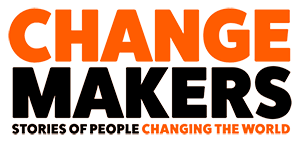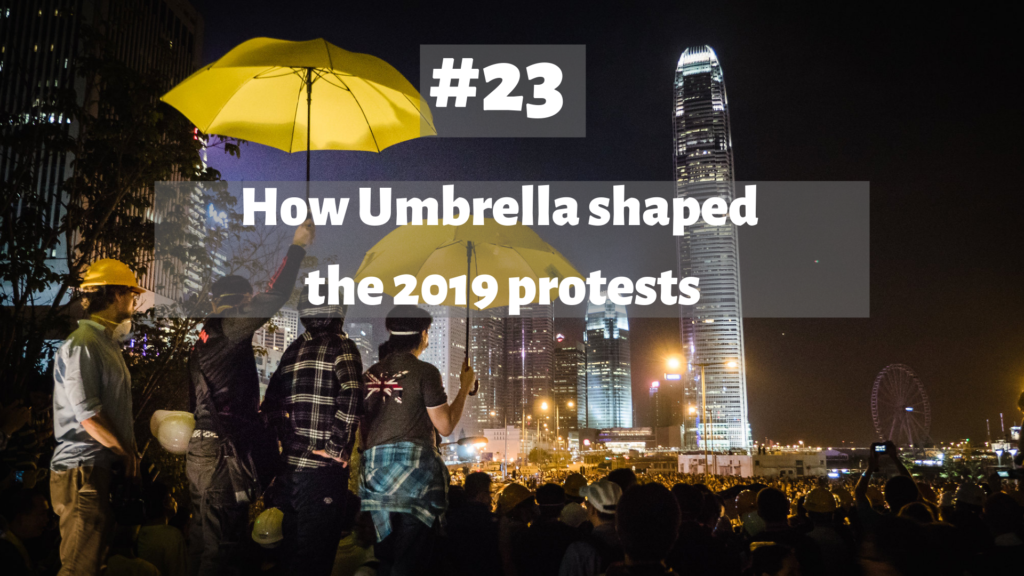#23 – How Umbrella shaped the 2019 protests
The 2014 Umbrella Movement in Hong Kong was a defeat, but it also generated key insights. We explore how it has guided the 2019 Hong Kong Protest movement.
Listen by clicking play above, or listen via an app on Apple, PodcastOne or Stitcher – or on most other podcast apps by searching “ChangeMakers.” Or use our RSS feed.
FULL TRANSCRIPT OF EPISODE #23
– HOW UMBRELLA SHAPED THE HONG KONG PROTESTS
HOST: On the 15 December 2014, after 79 Days of Street Occupation in Hong Kong – the Umbrella Movement was over.
The Umbrella Occupation was about giving Hong Kong residents full franchise in order to end a rigged system that let Beijing virtually appoint Hong Kong’s chief executive. If you don’t know much about it, we have a whole episode dedicated to the battle – Episode #12 – you might want to check it out.
That fight was a turning point. While it was ambitious and caught the world’s attention, for those who were there – it felt like a tragic loss.
Fermi Wong, a close supporter of the Umbrella Movement’s Occupy Three leadership group, remembers.
AMANDA: So how did it feel at the end when it didn’t work?
FERMI WONG: I was entirely disappointed. After I went to surrender myself to the police. And I thought you know too. I don’t know why. It’s like have a sense of hopelessness and also have a sense of powerlessness I could not sleep…
HOST: Fermi was not alone.
SELONG – I think everyone was very disillusioned about how it seemed to have no effect. People were arrested and now some of the students were more disillusioned because the Umbrella Movement started and students felt empowered. I could feel that they felt that they could do something. They were making changes and then they were purged.
HOST: As a university lecturer Selong saw her students deeply affected by the loss. Social movement defeat is all encompassing. Yet it can also illuminate new paths. It’s only in the darkest sky that you can see the brightest stars. To understand the 2019 Hong Kong uprising, we must understand the impact of Umbrella.
AMANDA: Today I’m in Hong Kong again, this time on Harcourt Road where the Umbrella Movement started and where the Umbrella Movement ended after 79 days. Thousands of activists went home. They hadn’t achieved the universal suffrage they demanded and the movement had been hard. … They were … tear gassed from without months of occupation and strategic conflict from within. … But many who were there felt compelled that they needed to do things differently to carry their democracy work forward and learn from what had happened. We follow some new paths that emerged from that day. And we also track the spectre of authoritarianism that has followed them forward. Let’s go.
HOST: I’m Amanda Tattersall, welcome to Changemakers, the podcast telling stories about people changing the world. These episodes about Hong Kong were produced by Samuel Chu.
We are supported by the Sydney Policy Lab at the University of Sydney. They break down barriers between researchers, policy makers and community campaigners so we can build change together. Check them out at sydney.edu.au\policy-lab.
And you can sign up to our email list at changemakerspodcast.org.
HOST: The 2014 Umbrella Movement stood out because unusually, it made a claim for more democracy.
In the past, there had been lots of protests – but they had come together as declarations of ‘no.’ People had gathered to say no to sedition laws, no to the massacre of students in China, no to Chinese national education. The ‘no’ strategy had produced massive demonstrations – and they had met with some success – but it had not dramatically improved the underlying structure of Hong Kong’s undemocratic government.
Hong Kong’s constitution is written out in the Basic Law. This was the final deal struck between the United Kingdom and China in the 1997 Handover, and in it it offered a slither of hope for a more democratic Hong Kong. Article 45 stated that there was an ‘ultimate aim’ that the Chief Executive of Hong Kong – should be chosen by the people.
The purpose of Umbrella was to pressure Hong Kong and Beijing authorities to enact this ultimate goal at the 2017 Chief Executive Election.
For eighteen months a movement called ‘Occupy with Love and Peace’ advanced this positive claim for universal suffrage. But it was tough. Building a movement around a positive goal was much harder than saying no to an egregious law. When you have a positive claim, you have to create your own momentum. So, there was public discussion, a massive online referendum, town hall meetings and training in nonviolent civil disobedience.
And it worked, as Bonnie Leung from the Civil Human Rights Front explains, it became a real challenge to Beijing.
BONNIE LEUNG: So that is the very first time for so many years that Hong Kong people find a way to escalate our actions to to make to the governments to hear from us.
HOST: But things don’t always go according to plan. The strong student movement at the time, led by people like Joshua Wong and Nathan Law, pipped them at the post and on 26 September 2014, they staged an occupation at the government offices a week earlier than the civil disobedience had been planned. Some students climbed fences to occupy Civic Square. On 27 September, tear gas was used for the first time in Hong Kong. But the tear gas didn’t turn people away as the police expected.
BONNIE LEUNG: That really angered a lot of Hong Kong people who was watching TV at home and that those tear gas bombs 87 of them dropped onto us in fact instead of dispersing us it’s made even more Hong Kong people who come out to the street to support this movement.
HOST: While the occupation was still forming and while the tear gas was still in the air – frightening messages began circulating on people’s phones.
BONNIE LEUNG: There was so many horrible rumours. So the rumours had been the police may use the real guns. They may shoot, people may die at that day.
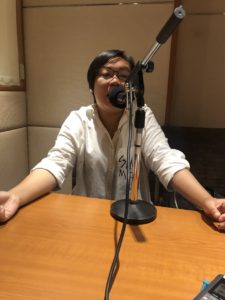
HOST: Older protesters directed people away from the harm.
BONNIE LEUNG: We started to use the mikes to ask if you are students if you are underage please leave immediately. It was very easy for us to leave because the MTR .. station was just right beside us. But I am very proud to say 80 percent people still state because this is how much we love Hong Kong.
HOST: The stakes of Umbrella were high. Many believed it was the final battle for universal suffrage, and people joined and stayed part of it with literally everything on the line. Participants adapted what they were wearing to suit the battle in front of them. It became a sort of unofficial uniform.
BONNIE LEUNG: We have a umbrella set and ace mask and goggles et cetera.
HOST: But less well known is that Beijing authorities also adapted to the situation. They decided to stop their escalation.
When the Occupy Trio met with Beijing’s representative in Hong Kong they were told there would be ‘ no bloodshed and no compromise.’
Kinman Chan who is one of the Occupy Trio and currently in jail, explained.
KINMAN CHAN: They are using a waiting strategy. They didn’t respond to our demand and then insist to occupy.
HOST: The occupation was initially exhilarating. But as Lee Chuck Yuen from the Union Confederation notes, these dynamics changed over time.
LEE CHUCK YUEN: It’s very romantic in the beginning but that was stuck in the sense that. How the go ahead? You know the problem is always with this sort of the Occupy movement is. What to do next?
HOST: Inside the movement there were two different ideas about how to act – about how to fight for democracy.
LEE CHUCK YUEN: And a split among the strategy is what they call peaceful demonstration. And you know crashing with the police. And that’s the split at that time.
HOST: It’s interesting to know where strategies come from. The occupation was organised through a five party platform. A coalition of sorts.
LEE CHUCK YUEN: The Hong Kong Federation of Students the Hong Kong that Joshua Wong Demisto group, then the Occupy free trio. And then a pro-democracy legislator. And then the civil society. So we have a platform of five. And it’s so frustrating. I was the convenor of that platform.
HOST: Leaders were confounded by the fundamental conflict that sat between these two approaches.
LEE CHUCK YUEN: You know it’s very difficult to come up with a consensus on what to do next except to let the thing drag on and not really very easy. And then everyone is doing their own thing and without them. Really it’s very difficult to talk about the overall strategy.
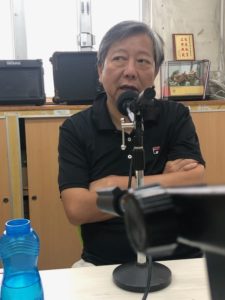
HOST: The principle of consensus decision making didn’t work. The different approaches to change couldn’t be reconciled.
KINMAN CHAN: Day after day and the people feel exhausted.
LEE CHUCK YUEN: So there’s a lot of worries in order to get go ahead and there’s discussion about retreating and there’s no way out. And finally it dragged on to a certain extent that the final way out is that the government announced that they will clear the place.
NEWS – CBS https://www.cbsnews.com/news/hong-kong-police-start-clearing-main-pro-democracy-protest-camp/ (0.00 – 0.21
“Police in Hong Kong this morning are clearing the main camp by pro-democracy protesters, they removed barricades … and arrested protesters who would not leave. ….”
HOST: It was a devastating time.
BONNIE LEUNG: I’m depressed and hopeless to be honest. … at that time a lot of people. Feared that or expected that we could sacrifice our life for this campaign… risks our lives. And nothing changed.
We already escalated our actions from half a million people took to the streets. Not a single window was broken. Kind of stage to we stay in a straight A lot of people being arrested voluntarily. I myself included. So what next. Was it simply has no hope.
HOST: This sense of hopelessness had many forms. Some of it was externalised – there was a deep uncertainty about the role of protest and public action – did they have the tools, the strategy to achieve the change they desired?
But the crisis was also internal – a sense that people didn’t know how to work together.
An inter-generational chasm had emerged. The vision and strategies of the old and the young had separated.
You see, under the Handover agreement with the United Kingdom, in 2047, Hong Kong will be handed back fully to the People’s Republic of China. This means the end for the one country, two systems arrangement, that made Hong Kong so distinct.
For the young, who would be in the prime of their lives in 2047, this was terrifying.
For Eddie Chu, a community activist and later Hong Kong Legislative Councilor, the defeat brought clarity.
EDDIE CHU: … that was also the final failure of the veteran Democrats. In asking for democracy within one country two system. We could have the chance to think about the destiny of Hong Kong from scratch …it’s always like our future was decided by someone else in the 80s. And even the path of democratic movement was set. And that was the only path the so-called universal suffrage. But the whole. Constitutional order, why the basic law was written like that. Why. Hong Kong needs to be financials centre. Why can’t we have a deficit budget? For me. The whole constitution needs to be rewritten. But nobody dared to say that before the Umbrella Movement.
HOST: Up until 2014 the Basic Law and the Handover deal had set the terms of the democracy debate in Hong Kong. The defeat of Umbrella upended the assumptions in the debate. In doing so, Umbrella’s tragic end created the space for people set a new vision. They could ask what kind of political life does Hong Kong need today?
In defeat you are left exposed and vulnerable. The victors seek to write the history.
In Hong Kong, pro-Beijing lawmakers like Regina Ip sought to proclaim Umbrella as a failed single issue movement that didn’t connect to the majority of the people, and to the big issues facing the community.
CLIP – REGINA IP – NEW PEOPLE’S PARTY
4:02 – 4:15
https://time.com/4047648/hong-kong-umbrella-revolution-occupy-anniversary/
“They have not been able to offer really constructive solutions to Hong Kong’s real social and economic problems. How do you fix the land shortage, the housing shortage, economic restructuring.”
HOST: Within the movement, leaders recognised that new forms of community outreach and connection were needed. As the Occupy Trio turned themselves into the police, they called on people to go back to their local communities and organise.
LEE: There’s always a saying that what they call … will have flower everywhere. You know. Yeah to go to a community to organize.
HOST: Let a thousand flowers bloom. This old idea of local organising gained currency partly because it was so different to a big protest.
BONNIE LEUNG: Umbrella Movement. … that didn’t work. So what would work. Obviously mass protest wasn’t one of the choices. So for many years Hong Kong people were not very eager to join these kind of mass protests.
HOST: People took up the call to move to the community.
KINMAN CHAN: After the movement many young people are establish community groups.
HOST: People had modest expectations about the potential of this work, as Benny Tai – one of the Occupy Trio – explained to Time Magazine in 2015.
BENNY TAI
4:40 – 5:03
https://time.com/4047648/hong-kong-umbrella-revolution-occupy-anniversary/
“It won’t be very dramatic, we won’t see the tear gas again it is more about laying down even stronger ground work. The importance is that we have to continue we have to persist, or we will never reach our final destination of universal suffrage.”
HOST: Out of this idea two distinct but connected organising strategies emerged.
FERMI WONG: After the … Umbrella Movement. Some of the people you know they d form two different groups with different purpose. For some poll you know some groups they really go to the communities we call you know go to planting the hope or try to spread … and some of them try to run that elections in their at this level.
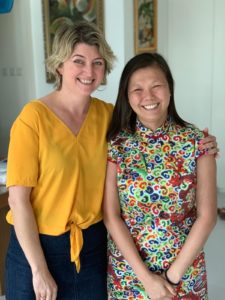
HOST: There were two approaches community building and political parties. The democratic goals of the Umbrella movement were deeply held, but many believed that they hadn’t succeeded in getting that message heard.
YIP KIM CHENG: I think it because the media maybe you know sometimes say it would be biased by uh man many kind of different interest. And the reporting is biased.
HOST: Yip Kim Cheng is a clinical psychologist and was inspired by Umbrella to do organising in the community.
YIP KIM CHENG: So we we need to do more community work. First we need to demonstrate or talk to the community people about the linkage between the direct election and the the daily life and daily social life.
HOST: It was the simple idea that democracy gives you a voice to improve your daily life. Its not just about constitutions and voting, but about making changes on all those key issues like education, transport and housing.
YIP KIM CHENG: Actually I remember that’s 80 to 100 facilitate people going to the district Som Sho Po district, because Sam Sho Po has a lot of poor people.
HOST: This action in Sham Soi Po began what became known as yellow day activities.
YIP KIM CHENG First we do a lot of … civic conversation. You can say that we go to the uh uh public space. We open … public stores .. we say we need to talk to each other about our lives our community our government. We ask for another volunteer uh uh facilitator … we go to a public talk and individual conversation. If uh it’s you citizen and we publish uh some uh leaflets to talk about the issue or to distribute to the Citizen. We try to liaise with some local community uh organizations and we uh.
We have exchange of views and had an exchange of uh skills with them about how to connect more to the no call community.
HOST: In addition, in places like Sham Soi Po, where there was a lot of poverty the program built direct community support.
YIP KIM CHENG: Sam Shoi Po yellow day we ask for um um more uh well off or those uh citizen. I could uh they could be the one to support other uh less people rich people and give out things.
HOST: Alongside about 20 to 30 community leaders, Kim Cheng and others moved from district to district building a community movement. They would spend about two weeks in each place, and across 2015 they engaged at least 12 of Hong Kong’s 18 districts.
Alongside the Yellow Day activities, other grassroots movements bloomed. Eddie Chu, an emerging community organiser, deepened his work with the Land Justice League focusing outside the city-centre in the Western New Territories.
EDDIE CHU: In practice it was only after the Umbrella movement that uh uh that I became active again since people started to … pay attention to community works or pay attention to local politics again.
HOST: Eddie’s work wasn’t just about bringing people together, it was about helping people interpret the political environment they were in.
EDDIE CHU: Helping groups in different areas to uh to start uh community works. And because these new participants say they were new to Hong Kong politics.
HOST: They were blank canvases.
EDDIE CHU: Their only experience was the Umbrella Movement in different occupy areas. So they … they were like white papers .. it is my task to introduce them to them the more complicated scene in districts.
HOST: Eddie’s organising work sought to embody the deepest ideals of the post-Umbrella democracy that he hoped to build in Hong Kong.
EDDIE CHU: So I had the feeling after Umbrella movement that finally. More people. Felt like. we should be the our master. Wwe should be the master of this city. We should no longer follow us but we should be creators. What is important is at least we we. We can make our first step and. build something for us intellectually or it is not big scale the small scale in communities.
HOST: This new movement soon came to be known as localism. It was not only about community action, but it also sought to intervene in the upcoming elections. Hong Kong’s limited governing structure has several representative bodies. There are District Councils which are very local, and then a central Legislative Council that governs the city as a whole. The Legislative Council is half made up of generally elected representatives, and the other half are appointed from narrower groups of professionals, called functional constituencies – which tend to be dominated by pro-Beijing forces.
Finally, to appoint the Chief Executive – an election committee 1200 representatives from the functional constituencies votes on a panel of candidates vetted by Beijing. The set up means that pro-Beijing forces have controlled the legislature.
That said, elections in Beijing are contested, and since the early 1990s democratic activists have successfully taken their community work to the electoral arena.
EDDIE CHU: Every time after a large mobilization … People go back to local politics. That was that one that has become a trend.
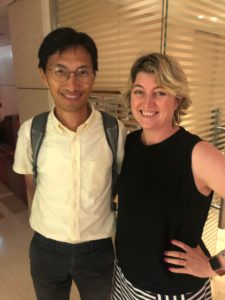
HOST: That trend was set to continue post-Umbrella with District Council elections set for November 2015 and Legislative Council elections in 2016.
EDDIE CHU: In 2015 and 2016 many new parties uh came out and um. and very active participation in politics and in election
HOST: But this time things were different. Umbrella had disrupted how politics was organised.
EDDIE CHU: In the past when we talk about democratic movement in Hong Kong there were always several icons. And we have a single project. Everybody agrees that. So what we need to do is wait for their orders and get mobilized, once a year twice a year. But after Umbrella Movement. It was totally different. Traditional Democratic Parties became less powerful and actually they lost the leadership in the movement. So nobody nobody knows who to follow. So that becomes… very chaotic. And then once again very attractive situation that everybody can have their say in what will be next for our city.
HOST: Many flowers bloomed. District movements created many parties. A surge of democratic candidates contested the 2015 District Council Election creating great hope for the city-wide 2016 election.
The activists from the Yellow Days movement began organising in the functional constituencies. Those arcane electoral groups had been set up by Beijing as a counter-weight to the geographical electorates. These seats were set aside for professional groups like business leaders in areas like agriculture, transport and medicine. Only registered professionals in those areas could vote for these representatives.
But some of the new democrats were professionals. Democratic leaders like Yin Kim Cheng were medical professionals, they began identifying people to run in those hard to win elections.
Umbrella veterans Joshua Wong and Nathan Law had also begun thinking about political parties. They had been inspired by Taiwan’s Sunflower Student movement – who – following a 2014 occupation of the Taiwan Legislature, had created a new political party called the New Power Party. By January 2016, the New Power Party had brought a more radical democratic independence agenda to the Taiwan legislature. As Bonnie explains, this had an impact on the Hong Kong movement.
BONNIE LEUNG: In Taiwan … They occupied their legislature. …we learned from their experiences as well some of activists in Hong Kong do you know personally uh of their leaders and then students leaders.
HOST: In April 2016 Nathan Law and Joshua Wong launched the Demosisto Party. They took aim at Beijing but equally at old style establishment pan-Democratic parties. Demosisto wanted to take the energy of Umbrella and the hope of the younger generation to Hong Kong’s parliamentary practice. Nathan Law planned to run for a seat on Hong Kong Island.
Demosisto was not alone. A series of independent and new parties contested seats in the Legislative Council, including Eddie Chu.
EDDIE CHU: Well my participation in it was a coincidence, I did not plan for that.
HOST: It’s hard to be an accidental politician, but at this time in 2016 – the political context required reluctant politicians to step up.
The politics of localism had become complicated. While people like Eddie discussed the local production of food to make an argument about environmentalism and local political autonomy, others twisted localism in a different way.
EDDIE CHU: At the same time there were different types of localists trying to combine this endeavour to a right wing racist thing. Saying that well …If the government does not stop immigration then everything you are doing in the community in vain. It leads to nowhere. So. You can do that but at the same time our major vision should be a stop off the new immigrants and also the establishment of a Hong Kong nation
HOST: Racist nationalism. It’s a global phenomenon. In Hong Kong – one strand of localism sought to attack Chinese mainlanders.
EDDIE CHU: What I found was that if I did not participate in the Legislative Council election then somebody will.
HOST: Eddie embraced being a candidate. One of his contributions was to bring new political debates into the mainstream.
EDDIE CHU: I tell the public the reality of the city the reality. In my opinion was that Hong Kong was a collusion between the government business sector and the landlords in the rural area and the Mafia groups. So and that resonated with the people. People had. Well. People out of mainstream party seldom talk about the underground world and its influence to our daily lives. And we saw this mafia groups employed people to attack peaceful protesters uh during the Umbrella Movement. And they are doing the same thing right now. So. I think it’s also one reason why I got so many votes
HOST: Eddie had seen Beijing fight dirty in local battles in the New Territories, like during the building of the fast train connection between Hong Kong and the mainland. His new political platform allowed him to teach a wider audience about the nuances of Hong Kong authoritarianism – like how every People’s Liberation Army posture is backed up by a Guerrilla Army of paid vigilante triad gangs. His strong agenda, backed up by years of local community organising paid off.
EDDIE CHU: I won the election and I got more than 80000 votes and that was the the highest numbers among candidates in all over Hong Kong. So that was.Unbelievable.
AMANDA: Why do you think you were so successful?
EDDIE CHU: I was successful not because I was smart It was because people are seeking for change and seeking for new faces seeking for someone who is not from big parties.
HOST: Kinman Chan from the Occupy Trio agreed it was significant
KINMAN CHAN: Not just young people but people like Tanya Chan, who is one of the keen in support of the movement …. Sil ga Chung, the social worker who hold the event every night in the Occupy in Admilty, he also got elected. He was also called electors and also had these young people from this new party.
I believe these young people have become more confident that they are able to participate in our politics. even in elections. So I guess there is going to have long term impact, particularly for the younger generations.
HOST: The September 2016 election was an unprecedented victory for the Democrats, but it wasn’t without controversy.
A variety of new localist democratic movements were successful, but they took seats from older Democratic Legislative Councillors. For Nathan Law, it was a change in the political guard.
NATHAN LAW
0.17-029
It shows how HK people wanted a change, and actually we were stuck in a democratic movement and people are voting for a new way and a new future for our democratic movement.”
HOST: The Democrats had not only won 29 of the 35 geographical constituencies, they also made in-roads into Beijing’s functional constituencies. The Democrats won 10 of these 35 seats. For the first time ever there was the possibility of a Democratic electoral majority. It would be constrained by the power of the Chief Executive – who had the power to introduce legislation, and it would require a series of very different democrats to work together. But something new had emerged.
What would happen now? What would Beijing do?
Beijing casts a long shadow on Hong Kong’s political life, and the 2016 elections were no different. While preparing to get elected to the Legislative Council, Nathan Law had to take time out to attend court hearings with fellow Umbrella student leaders Josuha Wong and Alex Chow. They faced charges of inciting others to take part in an unlawful assembly. Beijing’s authority had an ever present quality.
Then, in August, in an unusual turn of events, only weeks before the Legislative Council election – they were given suspended sentences and community service. No jail. Joshua Wong remarked at the time
JOSHUA WONG
0.07 – 0.29
“Compared to the sentencing of going to jail or other price we could have paid, actually community service for 80 hours is not really serious.”
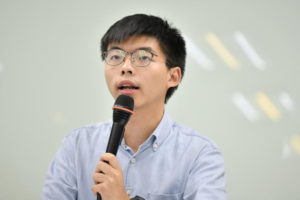
HOST: Hong Kong’s Chief Executive agreed and immediately ordered for the sentence to be revised. This was rejected in September, allowing Law to participate in the 2016 elections.
But Beijing was no hidden dragon. In less than three years every single visible Umbrella leader would serve significant jail time and Beijing would regain the balance of power in the Legislative Council.
Sometimes power is amassed by plan. Sometimes it is seized in a moment of opportunity.
Since 2004, democratic legislative councillors have used the oath taking ceremony, where new members are formally welcomed to the chamber to symbolically protest. As it was at the October 2016 oath taking ceremony following successful elections.
EDDIE CHU: During the oath-taking section that was the beginning of the … legislative council meeting. Many of the members from the opposition side chose to use that occasion to express their political views. So apart from reading the The Oath word by word, people try to add things before after or in between and use different ways to To express the opposition towards the mainland China. Government. And. I am one of them.
HOST: Immediately, the Chief Executive ordered that Eddie Chu and a dozen of his fellow Legislative Councilors were to be drawn into an unprecedented judicial review process – where Beijing authorities argued that they should be disqualified because they failed to follow the correct oath.
EDDIE CHU: Legislators did not deliberately looking for this disqualification. They only tried to seize that chance to express their views. But it was used by the Beijing government.
HOST: The Democrats were caught off-guard.
EDDIE CHU: I actually find two of my colleagues of taking quite offensive since they were using foul language and racist language against mainland China and I think that’s the reason why Beijing could get an upper hand.
HOST: A to and fro process pitted the courts against the legislature. But momentum was against the Democrats.
EDDIE CHU: Now when I go to those streets people was still angry about the way legislators took the oath. They felt very annoyed that we voted for you to criticize the government in meetings but not during the oath taking session and its a stupid act.
HOST: By mid-2017 six Legislative Councilors were disqualified – including Nathan Law. Just enough for Beijing to take back control of the Legislative Council.
EDDIE CHU: Change the election result by disqualifying legislators … and it led to a huge setback for the opposition.
HOST: The Umbrella Movement’s defining grievance was that Hong Kong people cannot choose their own leader.
Democrats had succeeded at the ballot box, but the Chief Executive was still appointed by a Beijing dominated 1200 person electoral committee.
On 26 March 2017 a new leader was appointed – Carrie Lam. In her acceptance speech she said she would bring people together to heal. The very next day a series of charges were issued against nine umbrella organisers – including the Occupy Three – Benny Tai, Kinman Chan and Reverend Chu.
The timing was not lost on Fermi Wong, a close supporter of the Occupy Three.
FERMI WONG: I was so angry so angry because you know what Carrie Lam said. That’s because he’s still very fresh memories. They say okay I want to repair the relationship between two parties. I went to reduce the, you know, the conflicts. I want to promote harmony. What’s she just say. But they will next day.
HOST: The charges against the group called – Umbrella Nine – were more obscure and threatening than the charges previously brought against the students.
KINMAN CHAN: We were charged for three Very peculiar offenses. Number one is conspiracy to cause public nuisance. No longer they use the public order audience to prosecute, they find something from common law, from the old days, talking about public nuisance. And they also charged us for conspiracy to cause public nuisance. This is the first charge. The second one is to incite people to cause public nuisance. Number three even more ridiculous. Inciting other to incite other to cause public nuisance.
AMANDA: Why do you think they used such obscure charges?
FERMI WONG: Because you know. I know if I very well the government. They really really hate Benny Tai. Yeah I was approached by Chinese embassy people. Yeah few times they really hate. Joshua Wong and Benny Tai. And what they want is they want to totally defeat Benny Tai. Either move him away of Hong Kong view. Or just put him to the jail. Know I want him to disappear anyway in the civil society. So that’s why they spend so long time. To find out is there any law that you know they can use and which you know and which can how you say you know as they are you know very long sentencing or you know serious punishment.
HOST: The charges were designed to send a message.
FERMI WONG: I was keep asking why why not arrest me to. But I know that because I don’t have any political influences.
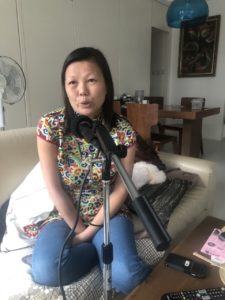
HOST: It was the first of many messages to be delivered by the Carrie Lam administration.
It was a long time between when the Umbrella Nine were charged and their trial. Between them, the students – Nathan Law, Joshua Wong and Alex Chow faced government appeal to their initial sentence. By August 2017 they were all in jail. The Umbrella Nine’s Court proceedings began in November 2018. It was a high profile trial. Enormous numbers of people came to watch. Fermi found herself in charge of logistics – corralling a team of volunteers to ensure that the families of the accused could have seats in the courtroom.
FERMI WONG: So I organize volunteers to line up. You know how early was 5 a.m.. The court start at 9:30 and we meet to line so as to get their seat taken. So I need to leave my home at 4am.
HOST: She became an unofficial court reporter, issuing daily updates from the court.
FERMI WONG: I just you know immediately we put what happened inside the court. show it my Facebook.
HOST: It was not like a usual court hearing.
AMANDA: It looked in the press and on social media. It was almost like it was it was a bit like a social movement. All this yellow everyone in yellow.
FERMI WONG: Yes.
AMANDA: Was that all planned?
FERMI WONG: I don’t think there’s a lot to say ism is not really intentionally. Oh I you know someone that really can make you happen. No I think he’s just not because the majority of Hong Kong people all share the importance of democracy
HOST: Preparing for the verdict and sentencing was difficult for them all.
FERMI WONG: Putting them into jail. I should expect you know that because psychologically emotionally. It’s really hard to take it. And just like you know we still you know hoping that there will be a miracle…
The feeling is like is really unsettling. That you know. What I was hoping was not possible.
HOST: Kinman Chan, one of the Occupy Three, saw his place in the trial not as a defendant but as a teacher.
KINMAN CHAN: For me is to face the trial bravely. It is an important demonstration to the rest of society, particularly young people that people are willing to sacrifice. Are for the betterment of the society. As a professor as a teacher I think this is the best ways to teach my students. Not just by words but by deeds, by our own commitment.
HOST: The courts were full on 24 April for the sentencing of the Umbrella Nine.
FERMI WONG: And when the judge read out the sentencing …
HOST: Benny Tai and Kinman Chan were taken into custody to begin 16 month sentences. Others received shorter or suspended sentences.
FERMI WONG: And I still feel very frustrating very sad because I if. The. Thing that they are not guilty. They committed no crime. But this so far because of the injustice because of political persecution.
HOST: A sense of injustice was not only being felt inside that courtroom.
A new debate about justice was emerging in the city of Hong Kong about an Extradition Bill.
In the same way that these arcane sentences embodied imperial overreach, the Extradition Bill used the excuse of a murder trial to propose legislation that could allow for any arrested Hong Kong citizen to be extradited to the mainland.
Four days after the Umbrella Nine were sentenced – on 28 April – one hundred and thirty thousand people protested against the Extradition Bill.
Beijing used all its power to close the chapter on Umbrella in 2019. But in doing so it unleashed something it could not have imagined.
The community organsier Saul Alinsky famously quipped – “every action has a reaction.”
The Umbrella Movement proved more reactive than most.
But its power was not in what happened, but what it taught all Hong Kong citizens about what it means to lead.
The brutality of Beijing meant that Umbrella’s visible leaders – the heroes of the movement, ended up – with targets on their backs.
So, as Miranda explains, post-Umbrella leadership had to be different.
MIRANDA YIP: You could say that everyone is a leader you know. Yes it is leaderless. It’s not the organized leader. We don’t have a very formal more organization to organize anything but in a way people take things in their own hands and everyone has ownership. If you have an idea just go for it.
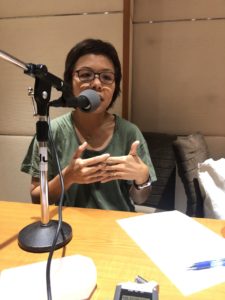
HOST: These leaders learnt new ways to take action too. The community organising and localism in 2015 was the start of something much bigger.
FERMI WONG: They learn that you’re not you just you know you don’t occupy on a street day by day. They learned that that is not use. So now you can see they just are water they occupy for one day or for a while and then they just you know. Disappear or run.
HOST: But the biggest reaction was felt by the young. Kinman Chan told me this in 2017.
KINMAN CHAN: I think the younger generation have been awakened by this movement. I talk to many many young people after the movement. They believe that it is such an important event in their life. And many people even changed their whole direction of studies or their vocation because of this movement.
HOST: Kinman was not able to see this emerge before he was jailed, but it is without question that he was right.
Extradition was built on Umbrella. The Hong Kong protests that followed – stretching across 5 demands call for fundamental changes in how Hong Kong is governed, how the police behave, how the city is led. They generate enormous hope, and just like Umbrella, and they sit in the shadow of Beijing’s reaction.
Our next episode looks into exactly this, and how the dynamics of the movement – and the politics of reaction have clashed in Hong Kong.
HOST: Changemakers is hosted by me, Amanda Tattersall. Remember to subscribe to this podcast to catch all our episodes.
Changemakers is produced by Amanda Tattersall, Samuel Chu. This episode is written by Amanda Tattersall. Our audio producers are Jules Wucherer.
Our sponsoring organisation is the Sydney Policy Lab at the University of Sydney. They break down barriers between researchers, policy makers and community campaigners so we can build change together. Check them out at sydney.edu.au\policy-lab. We are also supported by Amnesty International, Settlement Services International and the Organising Cities project funded by the Halloran Trust based at the University of Sydney.
Like us on Facebook at changemakers podcast and check out changemakerspodcast.org for transcripts and updates on all our stories.
And don’t forget to register for one of our MasterClasses if you want to take a deeper dive into the art of ChangeMaking.
Join our weekly email list to hear our latest musings, podcasts and training. Click on this button to subscribe:

